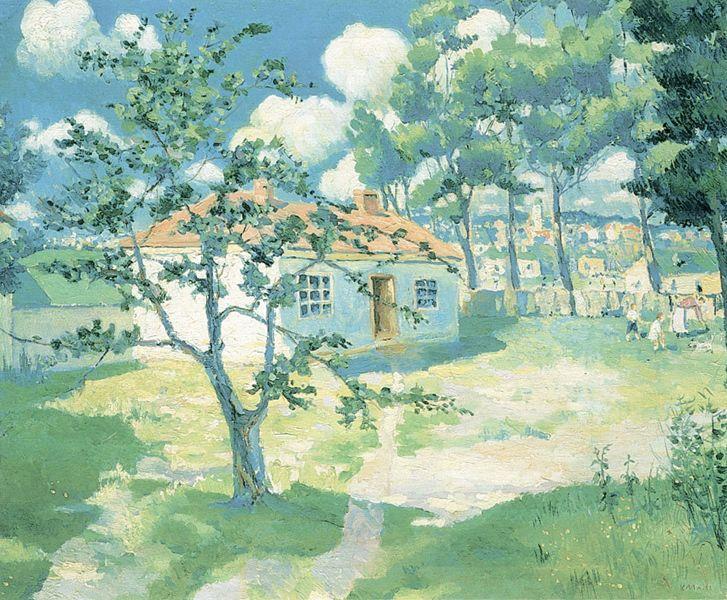Description
Kazimir Malevich, a central figure in the development of modern art, stood out for his constant search for simplification of forms and the use of color as a means of expression. His influence on Russian suprematism and constructivism is indisputable, and this can be seen in his work "Spring - 1929" (Spring - 1929), one of the least famous but equally significant pieces of his artistic career.
In "Spring - 1929", Malevich presents a scene that, at first glance, seems to be a figurative representation. The work shows a woman with a clear standing dress with two indefinite sexual figures. The characters are located in a vibrant landscape that reflects the spring station, a recurring theme in the representation of the Renaissance and renewal. However, unlike its most abstract compositions, here Malevich adopts a style that combines figurative elements with an abstract approach to color and shape treatment.
The artistic composition of the work is remarkable for its use of straight and simple lines that contrast with the soft curves of human figures. This simplicity of lines and shapes is characteristic of the author, who always sought the expression of the essential through formal reduction. The treatment of space is also worthy of mention, because the figures seem to float in a two -dimensional plane, challenging the traditional conventions of the perspective.
The use of color in "spring - 1929" is particularly striking. The warm and clear tones of the woman's dress and the background contrast vividly with the darkest and neutral colors of the other figures and the landscape. This colored juxtaposition not only creates a visual balance, but also evokes a sensation of freshness and vitality of the station represented.
Although Malevich is mainly known for his suprematist works, where pure geometric figures prevail on a white background, "spring - 1929" demonstrates his ability to integrate human figures in his search for abstraction and artistic purity. In this sense, the painting It can be seen as a transition or a dialogue between total abstraction and figurative representation, reflecting the duality and evolution in Malevich's work.
A particularly interesting facet of this work is how Malevich, through seemingly simple elements, manages to transmit complex and emotionally loaded concepts. The roundness of the heads and the simplicity of the extremities of the figures suggest a universality and timelessness in their message, inviting the viewer to a deeper reflection on the human condition and nature.
In conclusion, "Spring - 1929" is a piece that, although less discussed than other works by Malevich, offers a rich and nuanced vision of its artistic approach. The combination of figurative elements with the abstraction, the wise use of color and the clean and balanced composition make this painting an exemplary sample of the balance that Malevich achieved between the realistic representation and its search for the pure essence of the form and color. This painting Not only reminds us of Malevich's technical ability, but also his deep understanding of the ability of the art to communicate and cause emotion through simplicity and abstraction.
KUADROS ©, a famous paint on your wall.
Hand-made oil painting reproductions, with the quality of professional artists and the distinctive seal of KUADROS ©.
Art reproduction service with satisfaction guarantee. If you are not completely satisfied with the replica of your painting, we refund your money 100%.

